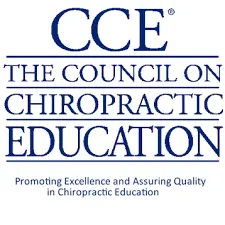Council on Chiropractic Education (CCE)
Council on Chiropractic Education is a national agency that accredits institutions and programs that award a Doctor of Chiropractic degree and follow the accreditation standards. For more information on CCE, read the blog.
Council on Chiropractic Education (CCE)
Council on Chiropractic Education or CCE is a national accreditation agency in the United States for accrediting programs and institutions offering Doctor of Chiropractic degree.
The agency was founded in 1971 to measure the quality of education in the programs dealing with chiropractic training and set standards for the higher level of education served in various institutions. It is recognized by USDE and CHEA. The agency is also a member of the Association of Specialized and Professional Accreditors (ASPA).
The CCE seeks to assess how productively institutions plan, incorporate, and evaluate their goals, objectives, inputs, fiscal resources, and results of their running chiropractic programs.
 source - stock.adobe
source - stock.adobe
Eligibility requirements for CCE accreditation
The mission of CCE is to achieve excellence in the accreditation of programs offering Doctor of chiropractic degree.
Certain eligibility requirements must be met prior to applying for accreditation, some of which are listed below.
-
The institute must have the authorization to operate in the given region from the authorized Government agencies and to award a degree in DCP.
-
It has a governing body that deals with the public and reflects the institutions' work towards the public interest.
-
A governing body which ensures that the DCP meets the CCE standards for accreditation.
-
The DCP goals, missions, and objectives must be in line with the CCE standards.
-
Presence of a well-documented plan for the ongoing academic process, how the resources are allocated to support the process, and the modification of the running process in accordance with the outcomes and analysis.
-
The curriculum must include topics such as Foundation Subjects, Basic Sciences, Clinical Sciences, and Professional Practice.
-
Proper plans for assessing student learning outcomes.
-
The DCP must disclose the current accreditation status from any agency and any previous interactions with the council.
Process for CCE accreditation
The accreditation process of CCE largely relies on a peer-based review procedure that is mission-driven, evidence-informed, and result-oriented.
The steps involved in the accreditation process are as follows.
-
A letter of intent is to be sent from the governing head of the institution stating that their DCP program seeks accreditation and submitting the documentation to confirm that all the eligibility requirements are met.
-
The Council verifies the documentation and upon successful verification, it forwards the matter to CCE administrative staff. Together along with the DCP, they decide the schedule for the accreditation process including self-study and site visit dates.
-
The DPC must conduct the self-study process as per the specified guidelines set by the Council.
-
After receiving the receipt of the self-study report, the Council appoints a team to conduct the site visit. The purpose of this visit is to physically verify that contents of the self-study report are true and in terms of the standards.
-
Following the site visit, the appointed team submits a site visit report stating how well the DCP conforms with the established standards.
-
The next step is the CCE Status Review Meeting. The whole objective of this meeting is to interact with members of DCPs and discuss the findings of the team during the site visit and how well the DCP has performed on the accreditation eligibility parameters.
-
After taking into account the self-study documentation provided by the DCP, the site-visit report, the program's response to the site report, and any other related information, the accreditation status is determined.
-
The council requires a few additional reports to confirm whether the DCP is still in compliance with the standards or not.
 source - cce.org
source - cce.org
Guiding Values of CCE
The agency is committed to ensuring that its accredited doctor of chiropractic degree programs and residency programs exhibit quality and integrity as mentioned in the standards.
The values imbibed by CCE are given.
-
Integrity is the foundation in all interactions
-
Accountability towards the public and students
-
Collaboration with different communities and respect for their culture
-
Quality on the basis of evidence
-
Improvement to seek excellence in the programs
Decision Making Bodies Of CCE
The number of council members shall be between 13 to 18. No two members should be from the same DCP, or institute rendering a DCP degree.
Moreover, not more than 3 members can be the chief administrative officer of DCP or equivalent position. The counselor cannot serve as an officer or Board Member of any affiliated institution.
Benefits of CCE accreditation
Accreditation is a measure of both quality and quantity. The following are the benefits of CCE accreditation.
-
The quality of high-level chiropractic education can be assured.
-
The students can trust the quality of education in accredited institutions as they have undergone a rigorous process to get accredited.
-
The details about the institute are documented and presented to the public to analyze and make the right decision.
-
In order to achieve accreditation status, institutions strive to enhance the quality of the education.
-
It helps to determine if an institution meets the minimum standards and benchmark in terms of quality and professional education.
CCE Accredited Colleges and Universities
CCE accredits only those programs which meet the established standards and strive towards quality education.
Here is a list of a few colleges and universities that are accredited by CCE.
| List of Colleges and Universities accredited by CCE | |
| Cleveland University | Keiser University |
| University of Bridgeport | Life University |
| Logan University | Southern California University of Health Sciences |
| Texas Chiropractic College | D'Youville College |
 source - facebook.com
source - facebook.com
Conclusion
With the establishment of the Council on Chiropractic Education in the early 1970s, the evaluation of pedagogy, student learning outcomes have driven the change in academic structure in chiropractic schools.
Over the years, the standards for quality have continuously changed considering the feedback from peers and has constantly improved the level of education served in these schools.
The students can be assured to get high-quality education in the institute if it is accredited by CCE. The reliance on accreditation for the quality purpose is an indicator of the trust exhibited by the students and the public in CCE accreditation.